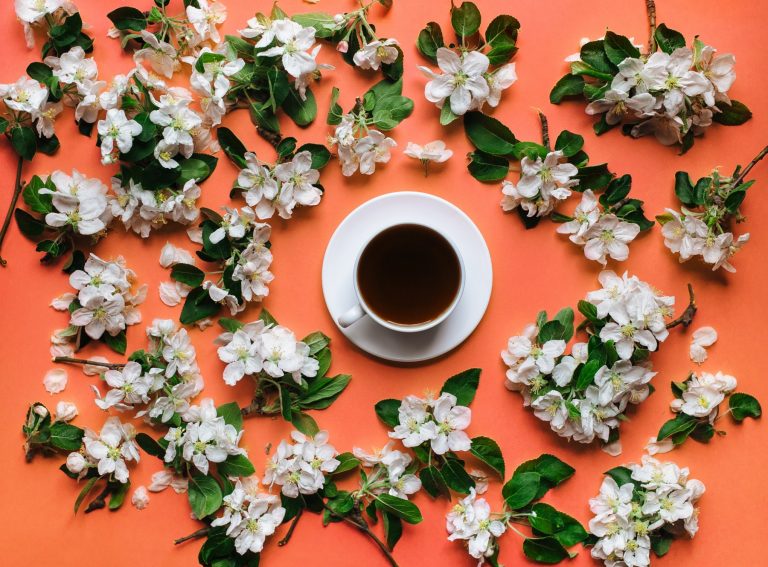You’ve probably heard that herbal tea is good for you. Maybe you enjoy making herbal tea yourself and have incorporated it into your self-care and wellness routine. Even in most restaurants these days, you can get a caffeine-free herbal tea like chamomile to enjoy with or after your meal. But what you may not know is that the tea you’re probably making isn’t giving you all the benefits of the plants that it could. That convenient box of herbal tea that you buy at the grocery store is just not very effective.
So what’s wrong with grocery-store tea?
The relaxing ritual of drinking herbal tea has become increasingly popular as herbal remedies have gone mainstream. And simply enjoying the flavor is a worthwhile pursuit — but if you want the full wellness benefits of the plants in your tea, the boxed variety might not produce results.
The average tea bag contains 2-3 grams of plant material to steep in a cup of water (or, let’s be honest, many more if you’re a re-steeper). But to fully receive the claimed benefits of the plants, you’d need at least 2-3 tea bags’ worth of herbs per cup. Furthermore, most folks steep herbal tea for just a few minutes; that yields a delicate flavor, but it’s not enough time to extract the constituents from the herbs.
MORE: How to meditate when you’re terrible at meditating
Choosing and buying “real” tea
Fortunately, there’s a better way. By ordering bulk dried herbs (or even growing and drying your own), you can save money and easily make the potent tea that may support your wellness more fully.
Some of the most reputable places to get herbs are Mountain Rose Herbs or Frontier Co-Op. Consider buying in bulk: You’ll get a large supply of herbs at a cheaper price than buying just a bit.
Health benefits of high-quality, well-brewed tea
Properly brewed herbal tea is more concentrated than the tea most people make at home or order at a restaurant. This more concentrated tea — an infusion or a decoction, depending on the method (more on that below) — creates a potent herbal remedy that can help support your physical and mental well-being.
According to a study published in the Journal of Pharmaceutical Sciences and Research, drinking herbal tea has been shown to aid in digestion, encourage relaxation and even prevent cancer, among other benefits.
Chamomile and dandelion root for digestion

Because tea passes through the digestive tract, it’s an effective way to support digestion. For example, chamomile is one of the most popular herbal teas in the world; when made into an infusion, it’s traditionally used to soothe an upset stomach and the agitated mood it can cause.
Another useful digestion herb is dandelion root. Its bitter flavor may support peristalsis (the automatic muscle contractions that move food through the digestive tract) and encourage the release of bile to help break down food.
Passionflower and valerian for relaxation and sleep

The soothing aspect of warm tea is used to great effect to support rest. Many “sleepytime tea” blends include passionflower, which is traditionally used to promote relaxation and sleep. These blends also typically contain valerian, which does not taste great but is effective in promoting sleep for many folks. Valerian is best in a blend that masks its flavor (peppermint can be a great addition), but it can cause an upset stomach in some. Try this herb during the day at first to avoid the possibility of an unpleasant late night.
MORE: Think you have gut problems? Wait until you hear about your oral microbiome
How to properly make herbal tea full of wellness benefits
Making herbal tea that maximizes delivery of those healthy plant constituents is simple if you know the steps.
Dosage
To get the full benefits of the tea, drink 1 quart per day, sipping it throughout. This enables your body to absorb and benefit from it over a long period of time.
Infusions and decoctions
- Infusions are essentially the same as what the standard brewing method produces, but with a few differences. Infusions are best suited to leaf and flower teas such as chamomile and peppermint.
To make an infusion, cover 1 ounce of plant material with 1 quart of boiling water, and let it steep for at least 20 minutes before straining through a fine-mesh strainer or cheesecloth.
- Decoctions are best for roots and woody plants, such as valerian and dandelion.
To make a decoction, place 1 ounce of plant material in a saucepan and cover with approximately 1.5-2 quarts of water. Cook at a robust simmer for 20 minutes or more until the liquid is reduced to 1 quart. Then strain and enjoy.
Take your tea to the next level with our step-by-step kombucha tutorial.









